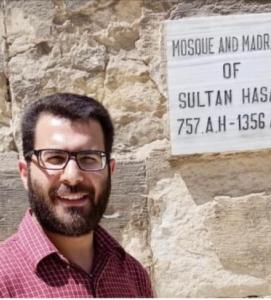Ahmed Arafat

Ahmed is a PhD student in the Divinity School in the Islamic Studies Department, focusing on the literary structure of the Qurʾān.
What does your work focus on?
I focus on Fakhr al-Dīn al-Rāzī’s study of the surah structure. There is an assumption that the holistic reading of the surah is a modern enterprise; however, a close reading of al-Rāzī’s exegetical work Mafātīḥ al-Ghayb reveals that he relies on his theological and dialectical expertise to read the surah, or a large block of its units, as a form of argumentation. This seems to be the underlying principle that motivates al-Rāzī’s consideration of the surah structure. He is fully au fait with the challenges and consequences of this approach. For instance, he establishes the case that the Qurʾān is essentially dialectical in nature. In this regard, he surveys the content of the Qurʾān to affirm that the Qurʾān is replete with “disputations,” and that the art of disputation is the profession of the prophets (ḥirfat al-anbiyāʾ). He goes further to conclude that the interpretation of the Qurʾān requires a theologian-exegete who can identify the theological objectives and persuasive techniques that, in his view, explain the logical flow of the Qurʾanic text. Hermeneutically, al-Rāzī’s deliberate consideration of the surah as a unified composition prompts him to counter exegetical taqlīd. This is evidenced in his critique of many cases of abrogation (naskh) and causes of revelation (asbāb al-nuzūl) that he considers to be breaking the flow of the surah text. Moreover, he utilized the notion of Qurʾanic unified composition to endorse some original interpretations that are not supported by the transmitted reports (āthār). My work also extends to examine the extent al-Rāzī’s approach to the surah design bear upon later exegetes.
Who or what inspires you and your work?
My project owes its genesis to inspirations gained from discussions about the literary structure of the surah in some of the classes facilitated by my esteemed advisor Professor Michael Sells. During these classes and seminars, many questions were raised about the structure of the surah and the logical flow of its material. Part of my participation in such classes was to consult major medieval exegetical works. In doing so, I found many relevant insights in al-Rāzī’s exegesis, and this is how I developed more interest in reading his work more deeply.
Can you describe an experience at the Divinity School that made you excited to learn here?
I graduated from al-Azhar University as the valedictorian of my class. In spite of my academic preparation and deep interest in religious studies, I faced many difficulties in my first couple of quarters due to some cultural, academic and social differences. I got the impression that studying here might not be the best for me. That was until I had my first class with Prof. James Robinson. Besides his great erudition, he is also a great encourager. My first presentation in the Divinity School was in one of his classes. After I finished the presentation, Prof. Robinson identified the areas of strength and gave me words of encouragement in class. When I returned home, I found a thank-you e-mail for the points I made in class. Same way applies to book reviews and final papers. That gave me a great feeling of belonging. That feeling makes one cope with different challenges. Not only did I survive my first year but I successfully received my master’s degree and got accepted in the PhD program as well. Thus, encouragement lifts our spirit and makes us work harder.

